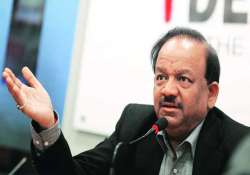Sex education in schools should be banned, says Health Minister Harsh Vardhan
New Delhi: Just a couple of days after the row over Health Minister Harsh Vadhan's remarks on fidelity over condoms to prevent AIDS, he has generated another controversy - this time by stating in his

New Delhi: Just a couple of days after the row over Health Minister Harsh Vadhan's remarks on fidelity over condoms to prevent AIDS, he has generated another controversy - this time by stating in his website that sex-education in schools should be banned.
In his 'vision document' for Delhi, Harsh Vardhan said that states must integrate value education with course content and put strong emphasis on exposing students to India's cultural relations. He added that Yoga education should be made compulsory.
"So-called 'sex education' to be banned. Value Education will be integrated with course content. Yoga should be made compulsory," says Vardhan in the document on his website.
Earlier, the health minister had created a stir by claiming the supremacy of fidelity as an AIDS prevention measure.
"Condoms promise safe sex, but the safest sex is through faithfulness to one's partner. Prevention is always better than cure," he was quoted as saying.
Public health activists are angry with the "vision" of the doctor-turned politician. Some public health activists said that the health minister appeared to be pushing the RSS agenda.
He, however, had rejected reports that he underplayed the role of condoms in fighting AIDS but insisted that official campaigns should focus on safe sex as a holistic concept which includes highlighting the role of "fidelity to single partners".
His statement on informing people on the supremacy of fidelity as an AIDS prevention measure is not only a piece of cultural advice but also a scientific one, he had said.
This is not the first time sex education has been opposed by political parties. With the view to generate awareness and inculcate necessary skills among adolescents and youth, a scheme for adolescent education programme in the school curriculum was promoted by the National AIDS Control Organization (NACO) and the Ministry of Human Resource Development (MHRD), which led to a major controversy in 2007.
Opponents argued for a ban on sex education in schools on the ground that it corrupted the youth and offended 'Indian values'. They contended that it may lead to promiscuity, experimentation and irresponsible sexual behaviour.
As fallout of this controversy, several Indian states including Gujarat, Madhya Pradesh, Maharashtra, Karnataka, Kerala, Rajasthan, Chhattisgarh and Goa declared that the course content as suggested by MHRD was unacceptable and thus banned the programme.
In his 'vision document' for Delhi, Harsh Vardhan said that states must integrate value education with course content and put strong emphasis on exposing students to India's cultural relations. He added that Yoga education should be made compulsory.
"So-called 'sex education' to be banned. Value Education will be integrated with course content. Yoga should be made compulsory," says Vardhan in the document on his website.
Earlier, the health minister had created a stir by claiming the supremacy of fidelity as an AIDS prevention measure.
"Condoms promise safe sex, but the safest sex is through faithfulness to one's partner. Prevention is always better than cure," he was quoted as saying.
Public health activists are angry with the "vision" of the doctor-turned politician. Some public health activists said that the health minister appeared to be pushing the RSS agenda.
He, however, had rejected reports that he underplayed the role of condoms in fighting AIDS but insisted that official campaigns should focus on safe sex as a holistic concept which includes highlighting the role of "fidelity to single partners".
His statement on informing people on the supremacy of fidelity as an AIDS prevention measure is not only a piece of cultural advice but also a scientific one, he had said.
This is not the first time sex education has been opposed by political parties. With the view to generate awareness and inculcate necessary skills among adolescents and youth, a scheme for adolescent education programme in the school curriculum was promoted by the National AIDS Control Organization (NACO) and the Ministry of Human Resource Development (MHRD), which led to a major controversy in 2007.
Opponents argued for a ban on sex education in schools on the ground that it corrupted the youth and offended 'Indian values'. They contended that it may lead to promiscuity, experimentation and irresponsible sexual behaviour.
As fallout of this controversy, several Indian states including Gujarat, Madhya Pradesh, Maharashtra, Karnataka, Kerala, Rajasthan, Chhattisgarh and Goa declared that the course content as suggested by MHRD was unacceptable and thus banned the programme.